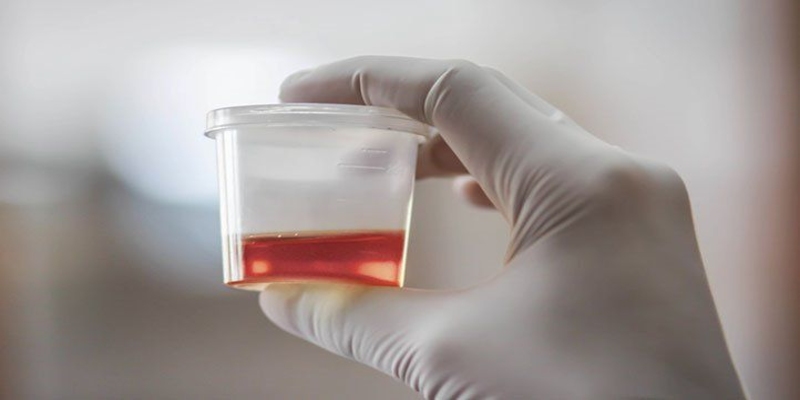Why Is There Blood in My Urine?
Nov 04, 2023 By Nancy Miller
Studies said that up to 16% of adults experienced Hematuria once in their lives. It's one of the most common symptoms of bladder cancer, but less than one in 10 people have bladder cancer in this case. Are you feeling anxious? No need to worry. Read the whole article. From symptoms to treatment, you will get all your answers.

What Is Blood In Urine (Hematuria)?
Hematuria is simply the presence of blood in urine. The naked eye can sometimes see this blood. Otherwise, you need to go for a urine test. Different types of Hematuria are as follows:
Gross Hematuria:
In gross Hematuria, there's enough blood present in the urine that it can be seen with the naked eye. Next time, if you find your urine red or pinkish, don't panic; it's a sign of gross Hematuria.
Microscopic Hematuria:
As you can suggest from the name Microscopic Hematuria, you need a microscope to find blood particles in urine. Lab tests are indicated in this case.
Dipstick Hematuria:
In Dipstick hematuria, you need the urine test strip to change its color due to oxidation of urine.
What Are The Most Common Causes Of Blood In Urine?
The famous proverb is that precaution is better than cure. The following heading is a sound example of this. Read all the causes and determine which is likely the reason for blood in your urine.

Urinary Tract Infections (UTIs):
If you feel pain and burning while peeing and your pee has a strong smell, then a urinary tract infection can be the reason for Hematuria. In UTIs, bacteria enter the tube through which urine passes the body and multiplies itself. These bacteria produced red blood cells.
Kidney Infection:
In kidney infection, males feel pain in their groin while females experience it in the back and sides. Fever is also a common symptom of kidney infection. Kidney infection or pyelonephritis bacteria enter the kidney from the bloodstream, then move towards the kidney from a pair of tubes connecting it to the bladder.
A Kidney Stone:
When mineral particles start making crystals at the walls of the kidney, they turn out to be kidney stones. Generally, kidney stones are not painful, but if they blockage your urine or leave the body through urine, the pain will be unbearable. In kidney stones, blood can be seen with the naked eye.
Enlarged Prostate:
As we started aging, our prostate started getting more significant. Until middle age, it's already an enlarged one. With an enlarged prostate, you might have trouble peeing, an urgent or lasting need to pee, or blood in the urine.
Kidney Disease:
The kidney disease or glomerulonephritis inflamed the tiny filters of the kidney. In this disease, blood can be easily seen by a microscope.
Inherited Illnesses:
It is also named as sickle cell anemia. If your family members have Hematuria, there are probably greater chances that you will be affected by it, too.
Medicines:
Well-known medicines such as cyclophosphamide (Cytoxan) and the antibiotic penicillin may save your body from cancer, but as a result, it affects your urine with blood in it.
Hard Exercise:
Exercises like marathon running and football also affect our bladder, although it only requires one week to heal. After that, you will never see blood in your urine.
When Should I See My Doctor?
You should never ignore blood in your urine. It's essential to contact your family doctor if you see blood in your urine or any other symptom regarding Hematuria.
Never ignore the signs like:
- Discomfort while peeing.
- Sudden weight loss.
- Urgent urination
- Frequent peeing
You must consult the healthcare department if:
- You saw blood clots in your urine.
- You're experiencing fever, vomiting, and pain in your back, side, and abdomen.
What Are The Common Methods To Diagnose Hematuria?
Hematuria can be easily detected via lab tests. A few of them are as follows:

Urinalysis:
A lab test of the urine sample.
Urine Culture:
Lab test, which checks for an infection.
Ultrasound:
Ultrasound is the method through which your kidney, ureters, and bladder are examined.
Computed Tomography (CT) Scan:
A test that uses X-rays and computers to make cross-sectional images of your abdomen and pelvis.
Magnetic resonance imaging (MRI) scan:
A test that uses a large magnet, radio waves, and a computer to produce images of your organs and structures.
What Are The Medications To Treat The Causes Of Hematuria?
Medication For Kidney Disease:
Famous medications doctors prescribe are diuretics, drugs to lower blood pressure and cholesterol, and erythropoietin to build red blood cells if you're anemic.
Medication For Hematuria Caused By Infections:
Doctors usually prescribe antibiotics to kill the bacteria in the human body.
Medication For Sickle Cell Disease:
In this case, providers usually prescribe drugs that prevent blood cells from dying and turning into sickles. These drugs include hydroxyurea, pain medications, and antibiotics.
Medication For Enlarged Prostate:
Two major classes of medications are used in this condition, which include alpha-blockers and 5-alpha-reductase inhibitors.
Who Is At The Risk For Hematuria?
Age:
Middle-aged or older aged people are at high risk due to enlarged prostate glands. The chances of a few cancers also increased because of this gland.
Urinary Tract Infection:
It's the top cause of blood in children's urine.
Family History:
If one or more family members have kidney diseases, then you need more precautions as compared to any other individual.
Final Words:
Hematuria, or the presence of blood in urine, can be a concerning symptom, but it's essential to understand that it doesn't always indicate a severe condition like bladder cancer. There are various types of Hematuria, and it can be caused by a range of factors, including urinary tract infections, kidney issues, kidney stones, an enlarged prostate, and even inherited illnesses.
If you experience any of the concerning symptoms mentioned in this article, consult your doctor promptly for a proper diagnosis and treatment. Your health is a top priority. Don't delay, take action today!
-
 Nov 04, 2023
Nov 04, 2023Why Is There Blood in My Urine?
Learn about Hematuria, its common causes, symptoms, and available treatments. Don't ignore signs of blood in your urine; get informed and take action.
-
 Oct 29, 2023
Oct 29, 2023Demystifying Pediatric Immunizations: A Comprehensive Guide for Parents
Discover the essential information every parent should know about pediatric immunizations. From schedules to safety, we've got you covered.
-
 Oct 30, 2023
Oct 30, 2023Combatting Maskne: Your Ultimate Guide to Clear and Healthy Skin
Discover expert tips to prevent and treat Maskne in this comprehensive guide. Say goodbye to mask-induced breakouts and hello to clear, radiant skin!
-
 Nov 02, 2023
Nov 02, 2023Dermatologist Teen Advice for Different Skin Types
Uncover dermatologist-approved advice for young adult and teen skincare. Navigate your way to glowing, healthy skin.
